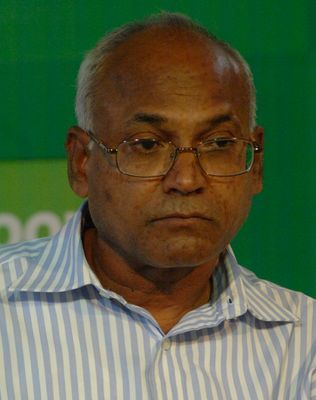 Kancha Ilaiah Shepherd
Kancha Ilaiah Shepherd
Ever since the Bharatiya Janata Party came to power, the pen is living in fear in India. The BJP is a political party that owes its allegiance to the Hindu religion. It works with many other wings that use violence as a weapon to control the lower castes and other religious forces but [does] not [use] the pen to convince people to change and follow their ideology. The BJP’s ideology is to rule people by creating fear among them. It actually believes in Hindu dictatorship. But, as of now, it wants to manage that dictatorship through the electoral process, with the support of the monopoly bania capital under the leadership of the Ambani and Adani companies.
The Indian bania industry never believed in creativity as an ideology of upward mobility in industrial production and distribution. It does not want to share jobs with the dalit-bahujan castes, but wants to exploit their labour without any human goodwill. Thus, it is inclined to operate as a Hindu industry but not as a liberal, democratic industry. The BJP is its political protector. Both of them see the productive and creative masses and the pen that writes for the masses as their potential enemies. Their exploitative, casteist survival is more important than the democratic creativity through writing, painting and dancing. The productive mass culture is seen as the BJP’s potential enemy.
Rightwing political parties in the west, particularly the Republican Party of America and the Conservative Party of the United Kingdom, have taken a pro-human rights stand. The greatest examples of human rights protectors as rulers were Abraham Lincoln and Winston Churchill. Lincoln was the first president who stood for the rights of African-American people. He personally invited Frederick Douglass and appreciated his efforts to work for the liberation of blacks. Winston Churchill left his most bitter critics, with pacifist opposition to his war heroism, untouched.
But the BJP as a rightwing party has been an anti-human rights party from its inception—its Jana Sangh avatar. Though it pretended to be pro-human rights after the 1975-1977 Emergency, it basically believes in sadhu rights and cow rights, but not human rights.
There are two reasons: one, it is a party that serves the interests of Brahmins and banias. The Brahmins control the temple economy and the banias control the market economy. Two, the BJP, as a political party, never talks about improving the conditions of the poor, abolishing untouchability and annihilation of caste system as a whole. Its political and social leadership hates dalits as people, no matter what they say during elections. Its students wing—the Akhil Bharatiya Vidyarthi Parishad—never organises lectures on unemployment, poverty, dignity of labour and human equality. They attack those who organise such lectures and seminars, and dub them anti-national.
For them, nationalism does not come from the productive labour masses in the fields; it does not come from the hard struggles of the foot soldiers fighting on the borders of China and Pakistan, but comes from yoga gurus, Peethadhipathis, sadhus, sanyasis and industrialists, who keep on saying dalit-bahujan masses are meritless and worthless. Their simple theory is that the producers are meritless and the consumers, who do not involve in production of the goods and commodities, are meritorious. The BJP believes in privatising every job, and anybody who asks for reservations in private sector becomes anti-national.
This theory of hating creativity was put in operation during the Vajpayee period only to some extent, but in Modi’s regime this theory has been put to its full operation. The murders of M.M. Kalburgi and Gauri Lankesh and the Arya Vysya attack against me [over his new book, Samajika Smugglurlu Komatollu], with full support of the BJP, are a clear direction of hating the pen and loving the gun. The question before the pen lovers is: should we be afraid of them and stop writing? The answer in NO, come what may.
The author is a member of T-MASS that works for the rights of the oppressed and poor masses in Telangana.




